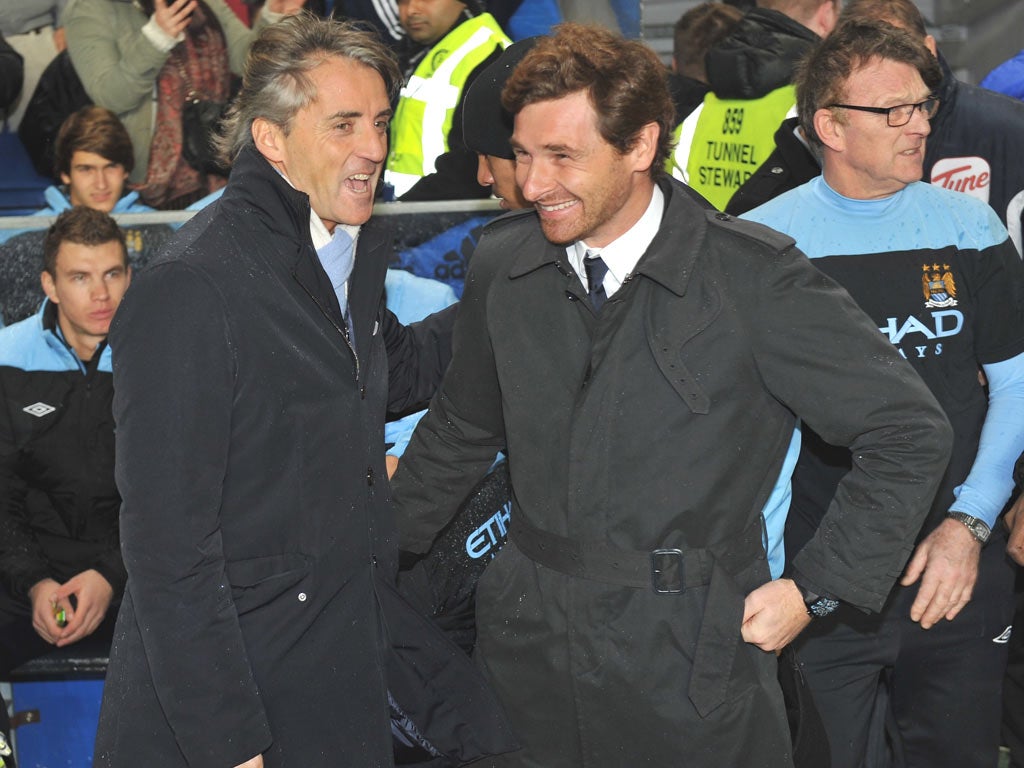The Independent's journalism is supported by our readers. When you purchase through links on our site, we may earn commission.
Villas-Boas can only look on as the old guard close ranks

Here, the crux of the issue facing Andre Villas-Boas, laid bare. As Chelsea drew deep into their well of resilience and determination and grit to staunch Manchester City's tide and then to turn it, ending a game with their title credentials enhanced, the futility of the Portuguese's position crystallised.
Not because, when Raul Meireles equalised and when Frank Lampard won the game, both failed to involve their manager in the ensuing celebrations, but because, with this win, they proved Chelsea's absolute conviction that they will succeed their way, not anyone else's, and most definitely not Villas-Boas's. There is a way he wants Chelsea to play, and there is a way that Chelsea play. He is not about to change it, because it works.
One by one, the tactical nuances and the philosophical tenets which brought Villas-Boas such unprecedented success at FC Porto, the dashes of dugout wizardry which brought the boy wonder to the eyes of the world, are being disassembled. He has acknowledged that he has had to do away with a rotating midfield – three players, each assuming the defensive, shielding role in turn, that the others might break forward – because, without a static holding player, the chaos of the Premier League becomes unmanageable.
He has, first tentatively against Newcastle, then in immaculate victory against Valencia, and now with this most valiant of points against the league leaders, the champions anoint, done away with his high line, replacing it with what he euphemistically calls a "low medium block". More plainly, it is a deep-lying defence. More honestly, it is the position which makes John Terry feel most comfortable.
And with it, Villas-Boas has lost much of the intensive pressing that helped Porto asphyxiate opponents, at home and abroad. Instead, they lie in wait for their foes, picking them off in their own half and breaking quickly; that one trait is what linked the Chelsea of old, the Chelsea of Jose Mourinho, with the Porto of Villas-Boas. The difference is that, where the latter preferred to do it along the ground, the former prefer to scud the ball through the air; his team, now, prefer to fly, too.
"This Chelsea is not the Chelsea which we are creating, that is for sure," said the Portuguese on the eve of this game, when asked whether he had betrayed his principles in acquiescing to reality. But it is the Chelsea which he has, and as long as its deployment brings victory, it is the Chelsea he must use.
It is the Chelsea where Terry and Ashley Cole seek Didier Drogba from deep, the Chelsea where a defensive midfielder sits deep, prowling in front of the defence and where the wingers tuck in narrow to play off their totemic Ivorian target. It is a chimera whose only beauty lies in its efficacy.
Villas-Boas was supposed to herald revolution, to wean Chelsea of their dependency on that old guard. It is not that simple; Carlo Ancelotti and Luiz Felipe Scolari could have told him that.
A club's players, ultimately, define its style. That is why Roberto Mancini has overseen such a huge turnover in personnel: he has been seeking those who might implement his beliefs.
Until Villas-Boas has the chance to do the same, his Chelsea will continue to be a utopia, in both senses: the best place, and no place at all.
Subscribe to Independent Premium to bookmark this article
Want to bookmark your favourite articles and stories to read or reference later? Start your Independent Premium subscription today.

Join our commenting forum
Join thought-provoking conversations, follow other Independent readers and see their replies
Comments